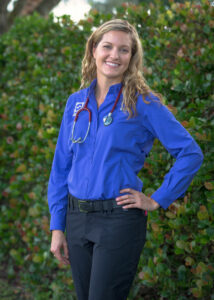Category: Team
Dr. Selina Passante-Watt traded in the cold winters of Canada for the sunny shores of South Florida and joined the practice at Palm Beach Equine Clinic in the fall of 2013. A veterinarian at just 32 years of age, Dr. Passante-Watt enjoys the team-oriented aspect and vast resources that working at Palm Beach Equine Clinic offers. She now splits her time between winters working at Palm Beach Equine Clinic and running a mobile practice with her husband in Western Canada during the summers.
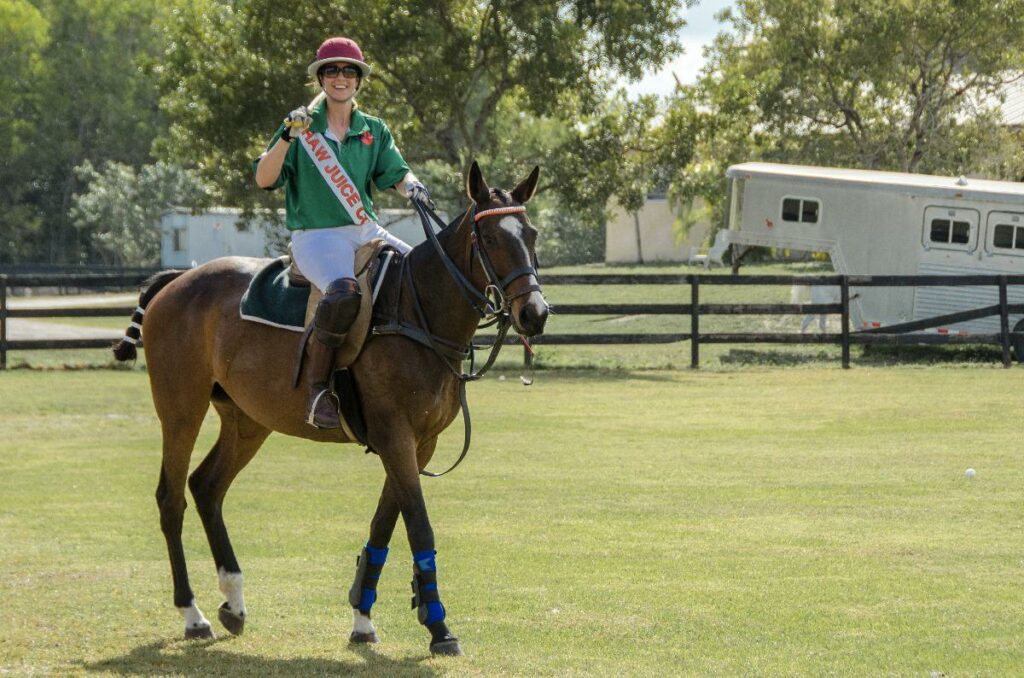
“There are a lot of specialists and very intelligent people at that practice, so the continual learning is incredibly valuable, especially as a young vet,” she acknowledged. “I learn every day. It is an amazing experience to be able to walk down the hall and knock on the door of one of the best board-certified surgeons or other specialist and say, ‘Hey, can you help me with this?’ You do not realize how beneficial that is until you leave, and you are in the middle of Western Canada and you wish that you had that.”
Originally from Winnipeg, Manitoba, Canada, Dr. Passante-Watt graduated from the Western College of Veterinary Medicine in Saskatoon, SK, in June 2012. After graduation, she moved west to Calgary, Alberta, and completed an internship in equine medicine and surgery at Moore Equine Veterinary Centre. She and her husband, who is also an equine veterinarian, relocated to South Florida in July of 2013 in order to pursue their equine veterinary careers.
Dr. Passante-Watt started riding when she was 10 years old and was a typical horse-crazy child. She took western riding lessons for a few years before falling in love with polo. When she was in high school, she got a job grooming and exercising polo horses in Winnipeg, which continued for six summers.
After high school, Dr. Passante-Watt was unsure what career path she wanted to take, so she embarked on a backpacking trip in Australia. She picked up small jobs while traveling, one being picking mangos. While on that mango farm, she found a small dog that was wounded from a fight with another dog. Dr. Passante-Watt took the dog, fixed his wounds, and nursed him back to health. It was that experience that inspired her to apply to veterinary school.
While attending vet school in Saskatoon, Dr. Passante-Watt met her husband, Dr. Walker Watt, and the pair got married in October of 2013. During his fourth year of vet school, Dr. Watt attended a conference and met some veterinarians from Teigland, Franklin, and Brokken, a racetrack practice at Gulfstream Park in Florida. He went to visit and did an externship there, later receiving a job offer. Dr. Watt and Dr. Passante-Watt then made the decision to move to Florida, where Dr. Watt took the racetrack job, and Dr. Passante-Watt found a position at Palm Beach Equine Clinic.
“Palm Beach Equine Clinic is a great practice,” Dr. Passante-Watt stated. “I have been working with Dr. Jorge Gomez, who works mainly on sport horses and more specifically on show jumpers, so it has been great getting involved in that world and receiving mentorship from Dr. Gomez. There is a lot of sport horse medicine that we do not see back home in Canada. It is a different world in Wellington; everything is a step ahead.”
The first year Dr. Passante-Watt and her husband moved to Florida, they stayed and worked for the full year. They then decided to split their time between the U.S. and Canada, just traveling to Florida for the winter season. They opened their own mobile practice in Western Canada, which Dr. Watt now runs year-round while his wife soaks up everything she can learn in Wellington throughout the winter.
“There is a lack of equine veterinarians in Southern Alberta where we live,” Dr. Passante-Watt explained. “There are a lot of mixed animal practitioners, but not a lot of specific equine practitioners, let alone in performance horses. That is why we decided to open a practice and just work on horses, and it has been going really well so far.”
Dr. Passante-Watt enjoys being able to draw on the resources of Palm Beach Equine Clinic even when she’s in Canada for the summer. “You can easily email people, send images, and pick up the phone and call someone with questions,” Dr. Passante-Watt stated. “I find everyone at Palm Beach Equine Clinic to be very helpful. As a vet early in my career, I think it is a great thing to work in a practice like that because it definitely pushes you to learn and be your best because you are working with the best.”
Having a state-of-the-art facility and equipment at Palm Beach Equine Clinic at her disposal throughout the winter is also a huge advantage.
“It is an amazing difference,” Dr. Passante-Watt noted. “I see both sides of it, because I am in Canada in the summer in my own small mobile practice with no bells and whistles, and then I come down to Palm Beach Equine Clinic and you have everything you could want at your fingertips. Every sort of pharmaceutical need, every tool, every cutting-edge technology, they just have it all right here. For the hospital, there are technicians and interns to monitor your cases overnight, and the 24-hour Intensive Care Unit is state-of-the-art. It is definitely set up to be successful, and with so many veterinarians, everyone is great about helping one another.”
Dr. Passante-Watt has many different veterinary interests, including diagnostic imaging, ophthalmology, lameness, dentistry and internal medicine. She really enjoys general practice, specializing in a little bit of everything. She is also certified in acupuncture and equine chiropractic from Options for Animals Chiropractic School.
As far as future goals, Dr. Passante-Watt plans to take it year by year, continuing to come to Palm Beach Equine Clinic in the winters, continuing to learn, and being the best veterinarian that she can be.
For Veterinary Technician Brianna Ploskunak, 22, of Royal Palm Beach, FL, horses are a passion. But not in the way you may think. Raised by a mother who rode and competed, Ploskunak found an early infatuation with all things equine that eventually drew her to veterinary medicine. At Palm Beach Equine Clinic, where she has been a part of the team since 2016, Ploskunak is one of 30 veterinary technicians who manage the hands-on care of equine patients and support the veterinarians in all aspects of the day-to-day operations. She works directly under Dr. Bryan Dubynsky, who specializes in sport horse medicine within the bustling competition atmosphere of Wellington, FL.
We caught up with Veterinary Technician Brianna Ploskunak to find out more:
What was your first introduction to horses?
My mom used to be a rider herself, so I grew up constantly surrounded by horses. She [rode] dressage for many years. I quickly followed in my mother’s footsteps and fell in love with the animal and the sport, although I never competed myself. Being around horses my entire life, I felt the need to do whatever I could to advance the health of each and every horse that I see. It means a lot to me to be able to contribute to their fast and healthy recovery.
What do you enjoy most about being a veterinary technician?
The number one thing I enjoy about treating horses is being a part of their journey from start to finish. Nothing brings me more joy than to see a horse that I have been working with through their recovery return to the show ring happy and healthier than ever before. These animals never cease to amaze me with their way of getting back onto their feet after an injury.
What is your average day like at Palm Beach Equine Clinic?
On an average day at Palm Beach Equine Clinic, I first meet Dr. Dubynsky to go over the morning appointments and gather all of the equipment and resources we need for the upcoming day. As we finalize our schedule, I work on completing all open items such as billing and inventory. We then prepare the truck to leave for the day and travel to a variety of different appointments throughout the Palm Beach County territory. Appointments vary depending upon the condition of the patient but often include radiographs and ultrasounds to injections and vaccinations. After we have seen all patients for that day, we return to the clinic and re-stock the inventory we have used that day. Lastly, we prepare for the following day by composing a new schedule of appointments and/or on-call horse show responsibilities.
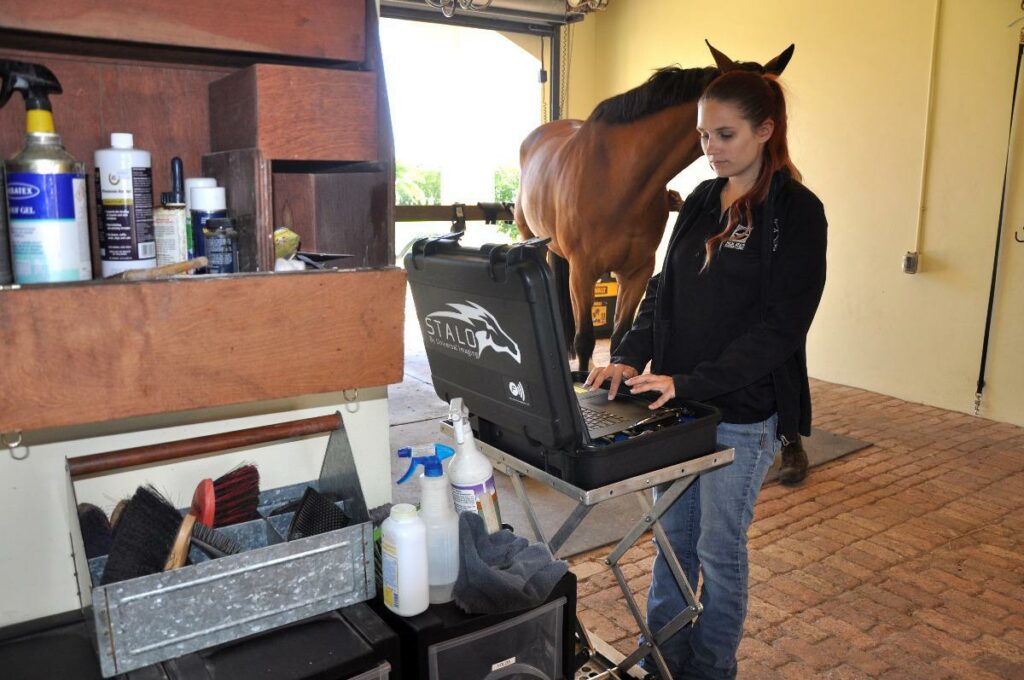
What is your favorite part about being a member of the Palm Beach Equine Clinic team?
My future goal is to continue to learn from the many experienced veterinarians I work alongside every day and build my experience and knowledge in the industry. That’s probably my favorite part as well; working alongside such talented and genuine people willing to give me multiple opportunities to learn and grow as a professional. It’s very hard to find a group of superiors willing to go the extra mile to teach young employees.
I have been able to experience some amazing things at Palm Beach Equine Clinic, including the intricacy of equine surgery and how the work of equine surgeons can bring a struggling horse back to top health. I really enjoy sports medicine because it’s not always sick horses – there is always something you can do to help the horse get back to peak performance. Whether it be radiographs, ultrasounds, injections etc., there is always something that can be done for the benefit and of the health of the horse.
What can we find you doing when you are not at Palm Beach Equine Clinic?
When I’m not working, you can catch me racing go-karts and spending quality time with my family, especially my one-year-old nephew, Elijah!
Palm Beach Equine Clinic (PBEC), based in Wellington, FL, is home to world-renowned surgeons, board-certified specialists, and state-of-the-art diagnostic technology. In addition, PBEC is home to over 30 veterinary technicians who provide comprehensive support to the veterinarians they work alongside.
PBEC takes pride in the diligence of the technicians who work in collaboration with the veterinarians to maintain the daily functionality of the clinic.
The typical responsibilities of an equine veterinary technician include:
- Manage veterinarians’ schedules
- Stock veterinarians’ mobile unit with supplies, equipment, and medications
- Accompany veterinarians on barn calls and emergency response
- Consult on cases with a veterinarian
- Care for and monitor horses admitted to the on-site clinic hospital
- Plan patient care and follow-up
- Oversee billing and invoices
According to Dr. Marilyn Connor, veterinary technicians are the right hands of the doctors they work with. PBEC employs over 30 technicians and the hands-on experience they have access to gives them invaluable opportunities to learn.
“One thing that is special about PBEC is that we have a full staff of technicians day and night,” said Dr. Connor, who first joined PBEC as an intern and now works as a full-time veterinarian. “They are the ones feeding and caring for horses, administering medications that do not require a doctor, and assisting veterinarians on cases. During the peak of the season, there are roughly 40 doctors with very diverse caseloads for technicians to learn and gain experience from.”
Yessica Arrua is one PBEC technician who has become an accomplice for veterinarian Dr. Natalia Novoa and the clinic in general. Arrua, 22, was born in Buenos Aires, Argentina, but now calls Florida home and is a pivotal part of the PBEC team.
5 Questions for Palm Beach Equine Clinic Yessica Arrua
1. How did you first get involved with horses?
I have been around horses since I was three years old. Both my parents have been working with horses since before I can remember. My dad works with polo ponies and my mom with dressage horses. They both traveled to Florida to pursue work with horses here and that is how I came to be a resident of Wellington and a team member with Palm Beach Equine Clinic.
2. What are your day-to-day responsibilities at PBEC?

I work with Dr. Natalia Novoa, who focuses on both traditional veterinary medicine and alternative therapies like chiropractic adjustments and acupuncture. My day-to-day responsibilities include making sure our truck is stocked with the equipment and medications that we may need. I also look after all the invoices in our system on a monthly basis. Overall, my role is to ensure Natalia has everything she needs and is prepared for our farm call visits.
3. What do you enjoy most about working with equine veterinarians and the horses they treat?
Other than being around horses every day, which is the best part of my job, I really enjoy being able to experience all the different types of cases that come through Palm Beach Equine Clinic. Especially during the winter season, we see so many interesting cases from emergencies to routine exams.
4. Do you have a favorite case?
My favorite cases to work on are the ones where horses have anhidrosis, which we see often in the Florida heat.
There is no universal or proven treatment for anhidrosis, but people often try salts, electrolytes, thyroid supplements, and even beer. But, Dr. Novoa has been able to help these horses with acupuncture. We had one case where the horse didn’t respond to any traditional treatments but started sweating right away during our first acupuncture treatment.
What is Anhidrosis? According to the American Association of Equine Practitioners (AAEP), anhidrosis is a compromised ability to sweat in the face of exercise or high ambient temperatures. This is a potentially dangerous condition for horses, especially working horses, because they thermoregulate (maintain a consistent body temperature) primarily through sweating.
5. What can we find you doing when you aren’t working at PBEC?
You will find me at the beach, reading, and spending time with my family!
At first glance, Dr. Santiago Demierre appears to be a young veterinarian making a name for himself in the field of equine medicine. A closer look, however, reveals that he is not only that but also an exceptional example of diligence; he’s also working to become an extraordinary veterinarian while speaking a second language all in a country that is 5,000 miles from his home.
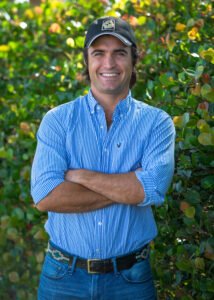
Born in San Antonio de Areco, a small town in the countryside outside Buenos Aires, Argentina, Dr. Demierre is now a 32-year-old veterinarian working with some of the most cutting-edge veterinary technology in the industry at Palm Beach Equine Clinic (PBEC) in Wellington, FL. He attended vet school at Universidad de Buenos Aires and graduated as Medico Veterinario in 2012 before setting a goal to validate his degree in the U.S. While mastering the English language, he enrolled in a certification program called the Educational Commission for Foreign Veterinary Graduates (ECFVG) through the American Veterinary Medicine Association and officially validated his degree in the U.S. in January 2017.
Today, Dr. Demierre is one of 40 veterinarians on staff at PBEC, which includes six boarded specialists and more than 80 technicians and staff members, making it one of the largest sport horse practices in the world.
Three things you may not know about Dr. Santiago Demierre:
1. Horses are in his blood.
Dr. Demierre: My father was a racehorse breeder and trainer, so while I was growing up I spent hours with him and the horses at the farm. I was always very interested in animals in general, not only horses, so even as a little kid I had the idea and the dream that I would be a veterinarian in order to be able to spend as much time with animals as I could. Now, I enjoy so many things about this work, but what really motivates me is the satisfaction I feel when I have a successful outcome on a case.
2. When the opportunity came to study veterinary medicine, he picked up and moved across the world.
Dr. Demierre: A fellow veterinarian who is a friend of mine, Dr. Eduardo Beccar Varela, contacted me with his nephew Dr. Axel Beccar Varela, who is a board-certified surgeon, and they offered me an externship at the clinic where he was practicing in Florida. I took that opportunity and began working in the U.S.
While here, a friend of mine, Gringo Colombres, introduced me to Dr. Scott Swerdlin, president of PBEC. He offered me an internship at PBEC in Wellington and I am now in my fourth season there.
The team at Palm Beach Equine Clinic is made up of great veterinarians and now great friends. There is always somebody from whom you can learn something new every day. Also, it is awesome to be in contact with the world’s top equine athletes. That is what I enjoy most about being part of the team at PBEC—working on performance horse cases. More specifically, I really like preventing and treating lameness in sport horses.
3. True to his Argentinian roots, he does some riding himself.
Dr. Demierre: I love being outdoors. When I am not treating patients or at the clinic, you can probably find me riding polo ponies. If I’m not there, I am either fishing, hunting, or enjoying some time off with my girlfriend.
Even after treating patients in both Argentina and North America, Dr. Demierre’s trans-continental bucket list is far from fulfilled. Next, he hopes to take the skills he has mastered at PBEC and validate his degree in Europe as well.
Want to learn more about the veterinarians of PBEC and what they have to offer your equine athlete or backyard companion horse? Call the clinic today at 561-793-1599 to learn more.
Meet PBEC Veterinarian Dr. Marilyn Connor
For some, becoming an equine veterinarian was always their calling. But, for Palm Beach Equine Clinic’s own Dr. Marilyn Connor, a diverse education and a healthy serving of life experience gave her options. Originally hailing from just north of Dallas, TX, Dr. Connor grew up around horses, but initially set her sights on going to medical school to study human medicine. Her undergraduate studies started at Tulane University in New Orleans, LA, before she transferred back to her home state of Texas to graduate in 2006 with honors from Texas A&M University with a Bachelor of Science degree in biomedical science and minors in chemistry and business.
After conducting a Master’s level research project on the effects of social stress on an animal model of multiple sclerosis, Dr. Connor broadened her horizons and moved to New York. While in New York, Dr. Connor spent three years as a research analyst and junior stock trader at a New York-based hedge fund. On her weekends, Dr. Connor volunteered at a therapeutic riding program in Brooklyn, NY, where she taught riding lessons to children, adults, and veterans. It was during her time volunteering at the therapeutic riding program, that Dr. Connor realized she wanted a career where she was able to help both people and animals. Ultimately, this passion lead her back to Texas where she attended four years of veterinary school at Texas A&M University.
Here’s the rest of Dr. Connor’s story
What led you to an internship at PBEC?
In veterinary medicine, unlike human medicine, it is optional to complete an internship after graduation before going into practice. It’s estimated that by completing an equine internship, because of the high caseload and number of hours worked, you gain anywhere from three to five years of experience. Because I was a non-traditional vet student, with a career before I started vet school, I really wanted to jumpstart my career so I could become an experienced veterinarian quickly. I felt that completing an internship was a good investment of my time, so I could get those additional hours of mentorship and become a excellent veterinarian. I considered many of the best practices in the country, mostly in California and Colorado, when searching for an internship. I met Dr. Swerdlin at an American Association of Equine Practitioners conference in Las Vegas two years ago and he invited me to come to Palm Beach Equine Clinic for a visit. I fell in love with the practice and the people, and felt the internship offered a good balance of autonomy to act as a doctor while still providing mentorship for a young veterinarian. One thing that’s unique about PBEC is that we have a full staff of technicians day and night so I knew, as an intern, I would be able to rest in the evenings so I could focus my time on learning and becoming a good veterinarian. In some practices, interns are expected to act as a doctor during the day, but at night they are required to come to the hospital to feed horses, cleaning stalls, or administer simple medications which could be done by a technician. Another big motivation for me was that we have so many doctors to collaborate with. During the peak of season, there are roughly 40 doctors here to learn and gain experience from. I was also impressed with the very diverse case load that comes into PBEC. Those are some of the reasons I joined PBEC as an intern in July 2017.
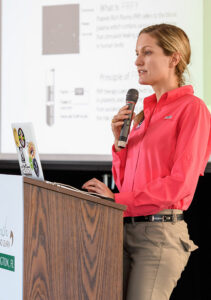
What is your experience with horses outside of being a veterinarian?
I like to say that I was riding horses since before I was born. My mom had horses and she rode while she was pregnant with me. When I was eight I got my first horse and rode western; mostly trails, pleasure, and a little bit of barrels, until I was twelve. Then I switched over to English riding and showed in both the Hunter and Jumper divisions until I was 18 and left for college. I didn’t have the means to bring a horse with me to school, so there was a period of about two years when I was only riding when I would come home.
During my sophomore year of college, I got a job at a barn exercising and training first and second-level dressage horses. Later in college, I had a friend who did competitive endurance racing and she had some spare horses that she needed ridden in competition so I did that and it’s something that I stayed with until today. As you can see, I have just about done it all when it comes to riding. I also have trained young horses and taught riding lessons since I was about 15 years old. After college, I spent some time teaching at a therapeutic riding center and this was one of the things that ultimately made me realize I wanted to be an equine veterinarian so that I could help both horses and the people that love them.
What is your typical day like at PBEC?
One of the things I love about being a veterinarian, is that no two days are the same! Most days, I come into the hospital first thing in the morning to, physical examinations and treatments on my hospitalized patients that are staying at PBEC. On some days, I manage anesthesia for the surgeries taking place at the clinic, so I must make sure the patient is physically healthy enough to handle anesthesia and undergo surgery. I then administer a combination of medications to induce and maintain them under general anesthesia for the surgery. I monitor them throughout the procedure and stay with them until they have fully recovered after surgery and are able to stand up and walk back to their stall. I am happy to report I will be staying on at Palm Beach Equine as an associate, so I am working on developing my client base within the clinic. now I make farm calls to see my patients and I also seeing many of the call-in appointments for routine veterinary care as well as daytime emergencies such as when people discover their horse has an injury or is sick. I have taken continuing education courses that are specific on dentistry, so I also see patients that require dental care such as having their teeth floated. I am also certified in veterinary chiropractic, so that’s another service that I bring to the clinic.
What’s your favorite kind of case to work on?
I like so many things about my job, but I really like helping my clients to maximize the health of their horses through nutrition, wellness care, and preventative medicine. I also like working with lameness in horses; diagnosing orthopedic conditions and treating them with a combination of traditional joint injections, regenerative medicine, rehabilitation, and alternative medicine. It’s very rewarding to help my equine patients to be able to do their job at a high level and stay sound. I also enjoy working with clients to understand things they can do to prevent their horse from needing those kind of interventions later on in life.
I do a lot of the veterinary care for the Vinceremos Therapeutic Riding Center, which PBEC supports. It is very rewarding to be able to give back to a cause that is important to me, but now in a different capacity as a veterinarian.
What do you enjoy most about working for PBEC?
One thing I enjoy about working at PBEC is that we are well-equipped with the most advanced technology and equipment rarely offered outside of a university setting. We have an amazing hospital facility, top quality surgeons, the latest in regenerative medicine, and the most advanced diagnostic tools including radiography, MRI, nuclear scintigraphy and our new Computed Tomography (CT) machine, which very few practices have. As a doctor, it is amazing to have every tool at my disposal, so I can provide the best quality veterinary care for my patients. But I think my favorite thing about working at PBEC and what really makes us unique as a practice is that we have an exceptional team of doctors with different backgrounds and slightly different skill sets. While every doctor essentially operates autonomously within the practice, it is still one big team. I have so many doctors I can call day or night if I am stumped on a case or need assurance that the treatment plan is appropriate. At PBEC we always collaborate to provide the best quality care for our patients.
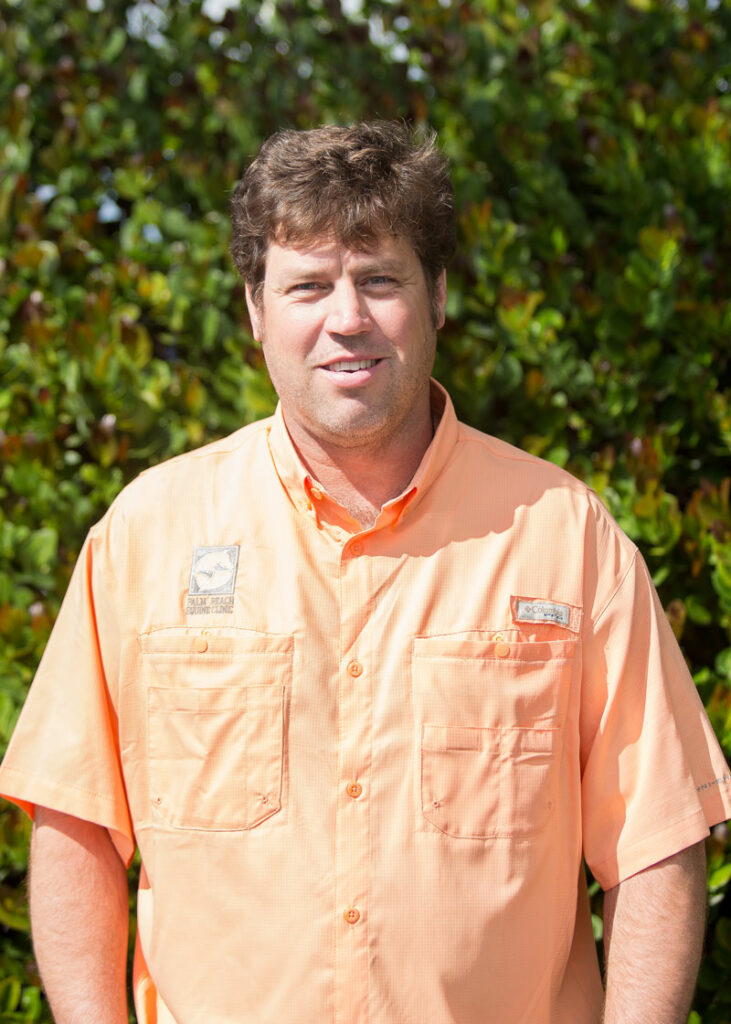
One of the repeatedly praised and recognized characteristics of Palm Beach Equine Clinic is the great pool of talented professionals from all specialties that make up the large team. In 2016, Dr. Peter Heidmann, DVM, MPH, began working with Palm Beach Equine Clinic for the winter season, and this year, the accomplished internal medicine specialist is returning to work with Palm Beach Equine Clinic for the duration of the 2018 winter season.
Dr. Heidmann graduated from Tufts University with his veterinary degree in 2000 before beginning a one-year internship in equine medicine and surgery at Arizona Equine, followed by a one-year surgical fellowship at Oregon State University, followed by a residency for internal medicine at the University of California, Davis, which he completed from 2002 to 2005. In 2005, Dr. Heidmann joined a private equine practice in Montana, and today he is the owner and hospital director of Montana Equine.
Q: What prompted you to pursue equine veterinary medicine?
I knew I wanted to be a vet for a long time, but I didn’t know that I wanted to practice more individually focused medicine until I was going through vet school. It wasn’t until my fourth year, where you’re actually starting to work with patients, that I made that realization. I started moving in that direction, and I had some faculty that saw the same for me and encouraged me to do the horse stuff. I always loved working with horses, but up until that time, I thought my background was too agricultural to do high-end sport horse work. But their encouragement helped me realize that wasn’t true. Then, I decided as a result of that realization and thought process, that I wanted to do an internship and residency to become specialized in internal medicine.
Q: What led you to Montana, and how has your role and practice evolved from when you started there in 2015 to today where you’re now the owner and hospital director of Montana Equine?
When I finished my residency at Davis in 2005, I wanted to be in the west. I wanted to be somewhere where there was nobody with my skill set – meaning internal medicine. I wanted to be in a small mountain town basically. Somewhere that I could practice the kind of medicine that I was trained to do but not in big metropolis. So, I narrowed it down to a practice in New Mexico and a practice in Montana. I went to work for a practice in Bozeman, MT, in July of 2005 and six months later my predecessor, Dr. Dave Catlin, passed away in a car crash. It was really sad. He had three kids, left a widow, and it was his dream to start an equine only specialty vet hospital, which he had done in 1999.
When he died, the conventional wisdom around Bozeman was, ‘Well this can’t be done. Dave had a dream, and it’s not a realizable dream now. There aren’t enough people here. Montana residents won’t understand specialized medicine and they won’t pay for it.’ I was faced with this proposition of leaving the practice after just arriving there, but I knew that was where I really wanted to be. I basically picked up the pieces of Dr. Catlin’s practice and formed Montana Equine in February of 2006.
Now we have a 7,500 square foot hospital with a surgery site at Bozeman, and I have a partner there, an associate, and two interns. We have two satellite locations: an ambulatory-only satellite in Helena, MT, and have nearly completed satellite clinic building in Billings, MT, which is the largest community in Montana.
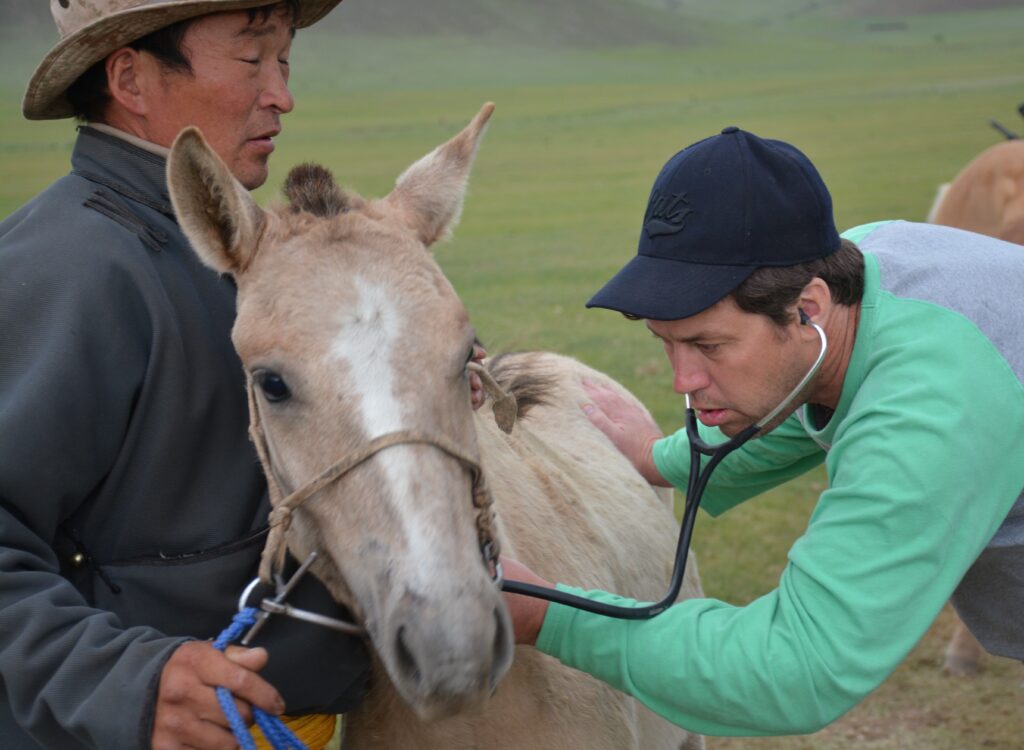
Q: You began working with Palm Beach Equine Clinic during the 2016 Winter Equestrian Festival (WEF) season, but you’re out in Montana and have your own practice there. How did that relationship come about, and what does it look like today?
There are various aspects to that. We’re very quiet in Montana from basically Thanksgiving through March, and it’s not really my personality to sit around. That’s one aspect, and another is from a business perspective, it allows me to bring more vets on and keep them year-round. A third element is the desire to do more high-end medicine, and a fourth element that led me to Wellington, is my wife, Allison, who is a professional jumper rider. Two years ago, during the winter of 2015, Allison had a girlfriend who had just had a baby and asked Allison to run her business for her here at WEF. I thought that was an interesting idea and started talking to Palm Beach Equine Clinic and found that there might be a need for an internal medicine specialist in their group. So that’s when I started coming. At that point, I was in Wellington for four or five days and then home for ten days, back and forth and back and forth. Then last year, I was more of a week here and a week at home. We had our first child, so Allison and Oliver, who was brand new then, were here straight through, but I went back home to Montana as well. The need is there and the relationship is great. So, this year, I’m in Wellington full-time for the WEF.
Q: What do you enjoy most about having the opportunity to practice with Palm Beach Equine Clinic?
It’s a huge group of people, so there are a lot of personalities. When you have a lot of different personalities, you have a lot of different perspectives on treatments, and that’s interesting and fun. It means that every year when I’m here, it’s pretty dynamic. Back in Bozeman, I have a great team, but I’m the leader of the team. I’m the oldest and the most experienced. That’s good, and that’s not to say that those guys don’t definitely come with new ideas, but being here, there are so many ways of doing things that I end up picking up new tricks or new ideas even though I’ve been practicing for most of two decades. So here at Palm Beach Equine Clinic, I’m picking up new strategies and new techniques separate from new stuff coming out in the world – just different ways of doing things, and different experienced veterinarians to bounce ideas off of. That’s really refreshing and stimulating.
From a vet’s perspective, with the Wellington demographic there is sometimes less of a limitation on budget and expense, so we’re really able to set that factor and worry aside and instead focus solely on what is best for the patient. The limitation isn’t financial; the limitation is just medicine and what we are able to do, which is exciting and allows us to see great results.
Q: Have you had any favorite cases or standout moments during your time with Palm Beach Equine Clinic thus far?
I won’t name any in particular, but what I really enjoy are the challenging medical cases, the internal medicine cases that tend to be really sick and that you’re able to fix. The most common ones that we see are probably sickness after colic surgery, horses with really bad diarrhea, so colitis cases, followed by foals. Those cases generally all have a lot of things going on in a lot of different organ systems. So, there are a lot of factors to balance. Internal medicine people like me are kind of inherently nerdy, and we really get into what’s happening with the acid-base status, electrolytes, blood gases, fluid volumes, and other technical aspects of horse medicine.
Q: What do you enjoy doing outside of work?
While in South Florida, we’re basically working all the time, so not as much here except trying to get exercise and be fit. I like to ride a bike or go for a run. At home, the Gallatin Valley – which is where Bozeman is – is surrounded all around by mountains. The valley floor at Bozeman is at about 5,000 feet, and the peaks are at 8,500, so you can do a lot of really serious hiking. Our son is only 18 months old, but he loves it. I’ve had dogs in the past where their whole personality changes when you get out of town, and that’s what Oliver is like too. It’s almost like his whole face is a different face when he’s out there.
Meet PBEC Veterinarian Dr. Natalia Novoa
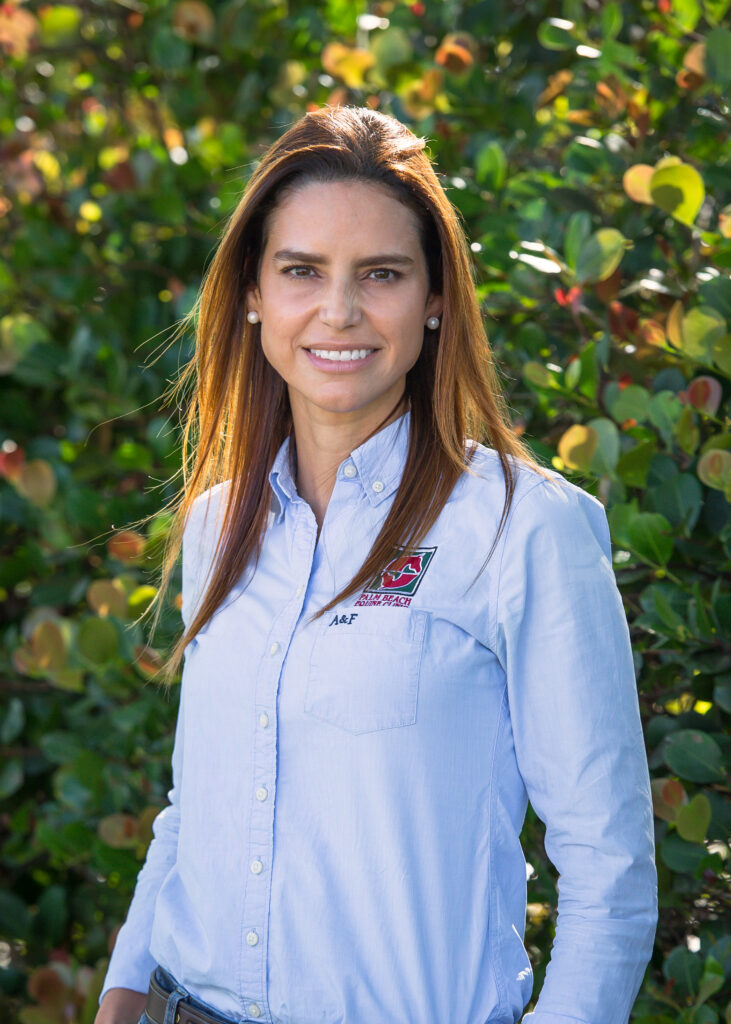
Dr. Natalia Novoa was born in Nashville, TN, and raised in Colombia, where she graduated from the University of La Salle. Upon returning to the United States, Novoa validated her degree in both the U.S. and Canada and received her chiropractic adjustments qualifications in Kansas and studied acupuncture in Florida. Novoa joined the Palm Beach Equine Clinic (PBEC) team for a short period in 2000, before spending several years following the hunter/jumper horse show circuit in Canada, Colorado, and Ocala, FL. She then re-joined the PBEC staff in 2011, and, with her veterinary license in Florida, Kentucky, North Carolina, and Canada, Novoa has been a valued member of their team ever since.
Q: How did you decide that you wanted to pursue veterinary medicine?
I have enjoyed having animals in my life since I was very young, but what was key to me deciding to pursue veterinary medicine was having a farm where I was able to gain skills and real-world experience that would prove handy down the road. I was able to practice with real medical cases and acquire knowledge in operational management, and it was an introduction to the lifestyle because it requires patience, hard work, commitment, determination, and accountability. It was a valuable opportunity to work hands-on in the environment with the veterinarian of my farm, absorbing, assimilating, and getting familiarized with the vet skills that were the building blocks for my future. He made me realize that veterinary medicine would fit me perfectly. That helped me set the foundation for my career, and since then, I didn’t have to look any further!
Q: What led you to PBEC?
I think of it like this: if I want to become the best at what I do then I have to work with the best, and I picked PBEC. They say, “Leadership is not about a title or designation. It’s about impact, influences, and inspiration.” Palm Beach Equine assumes the leadership role, chases the latest trends, and evolves continuously. In addition, we have a great team of skilled vets and staff who try to expand their vision and abilities to achieve success.
I have to say I have had seven great horse show seasons with Palm Beach Equine, and I’m looking forward to an eighth one. When you are doing what you love and you are working with great horses, time flies.
Q: What is your primary area of focus?

I focus on sports medicine and lameness, combining conventional medicine with alternative medicine; this includes chiropractic adjustments, acupuncture, and herbal therapy. To me those are great alternative tools for diagnosis and treatment. I have to say, they help you to look at a horse or a dog in a different way, and you have more tools and options. Regardless of the case – lameness, pain management, internal medicine, etc. – I have different choices to achieve results in those situations.
I perform chiropractic adjustments, acupuncture therapy, and laser treatments to small animals as well. Most horse people have dogs, so I’m able to take care of their companions too.
Q: What is a typical day like for you at PBEC?
It’s a busy agenda every day with continuous juggling. I’m usually dealing with lameness (involving diagnosis and treatment), doing pre-purchase exams, chiropractic adjustments, acupuncture therapies on horses and dogs, performing laser treatments, and at the end of the day, doing paperwork. Depending on the day, I could be doing FEI treatments, vet shift at the horse show, donating vet work at Vinceremos Therapeutic Riding Center, or dealing with an emergency. We’re a very mobile practice able to go from farm to farm and horse show to horse show (Kentucky; Tryon, NC; Ocala, FL), so I’m moving around a lot.
Q: What is your favorite part of the job?
There are so many aspects that I enjoy: working outdoors, closely with animals on a daily basis, and diagnosing and dealing with different issues to overcome problems; the privilege of working as a team with the clients and trainers and creating a great, close relationship with them; the connection with the animals and how they show you how grateful they are, and being able to see the improved outcome. There’s great satisfaction in successfully applying my knowledge and skills to a make a difference in someone’s life.

Q: Have you had any standout, favorite moments since beginning to work at PBEC?
When I had double success treating a ‘mystery’ case of a horse in which the owner was losing hope because other treatments were not showing good outcomes, and also treating her dog that was crying and unable to get in the car. The animals and owners were both happy and thankful. “For it is in giving that we receive” – having a positive impact on someone is correlated with high levels of overall job satisfaction.
Q: What do you enjoy doing outside of work?
I enjoy traveling with my daughter, Lola, and visiting my parents and siblings that live in different countries. I also love dancing to Latin music, running, playing tennis and squash. I’m a pretty competitive squash player, so I welcome any challengers!
Meet Surgical Resident Dr. Michael Myhre
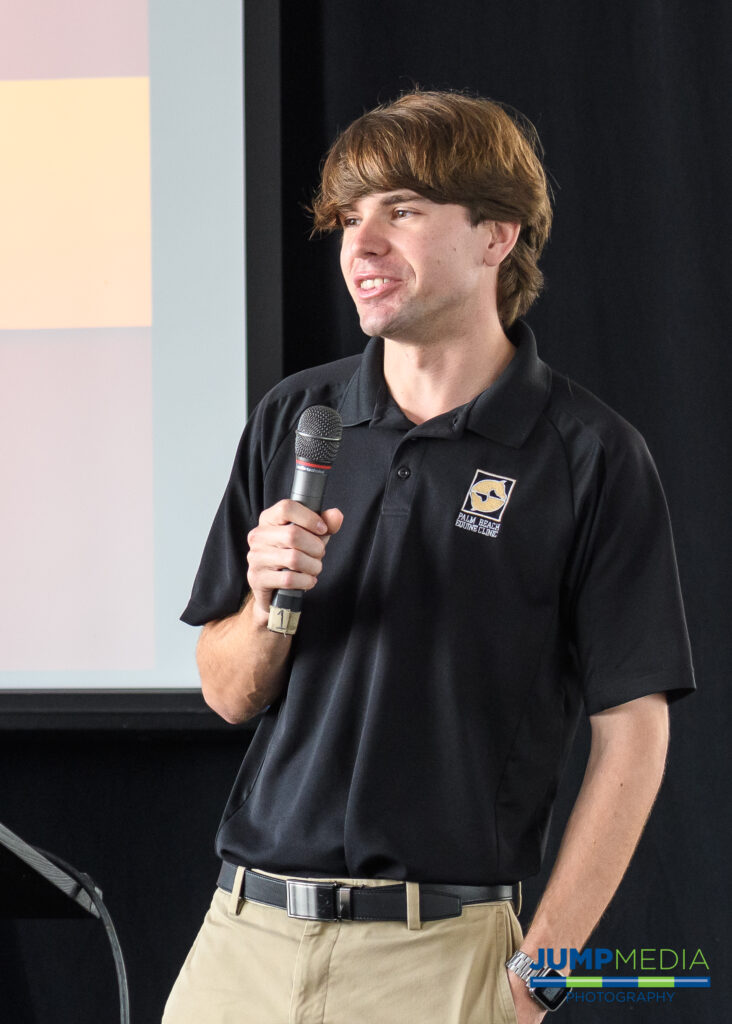
Dr. Michael Myhre was born to be a veterinarian. In 1978 his father, Dr. Grant Myhre, developed a referral practice, Myhre Equine Clinic in Rochester, NH. After working alongside his father since middle school, Dr. Myhre, who hails from Milton, NH, believes he was always destined to be a veterinarian. Dr. Myhre graduated from Cornell University College of Veterinary Medicine based in Ithaca, NY, in 2016, and he joined Palm Beach Equine Clinic thereafter as a surgical resident to work under the direction of board-certifed surgeons Dr. Robert Brusie, Dr. Jorge Gomez, and Dr. Weston Davis.
What is your background with horses?
I grew up in my father’s practice. He would bring me along to see outpatients and cut colics at 2 a.m. When I was in high school and college, I would work there during the summers as a technician. I kept learning from him and when it was time to decide what I would do, I applied to vet school.
We had some lesson horses at home and taught some therapeutic riding, so I rode on the trails occasionally, but I knew I was always supposed to be a veterinarian.
Where did you complete your undergraduate degree?
I attended Ithaca College in New York and studied computer science. It is a pretty unusual undergraduate degree for a veterinarian, but I did not want to go the traditional route of getting a biology degree. Computer technology is now involved in a lot of veterinary medicine – so much of what we do is going through computers, so it is an asset to have that degree.

I still took all the biology and chemistry classes at the same time, and I finished in three years. At that point, I applied to Cornell University and was accepted.
What led you to Palm Beach Equine Clinic?
I came here because it is the best residency program in the country. I have a big caseload and get to work on the best horses in the world. I started on July 1 and what I like the most is the diversity in cases. We have seen hunters, jumpers, dressage horses, and racehorses. I have done everything from condylar fracture repairs to MRIs, nuclear scintigraphy, x-rays, and even colic surgery on a miniature horse. Palm Beach Equine Clinic stays at the forefront of technology with a new standing surgery pit, standing MRI machine, and paperless medical records.
What goals do you have for your veterinary career?
After my three-year residency at Palm Beach Equine Clinic, I plan to move back to New Hampshire and work at my father’s practice.
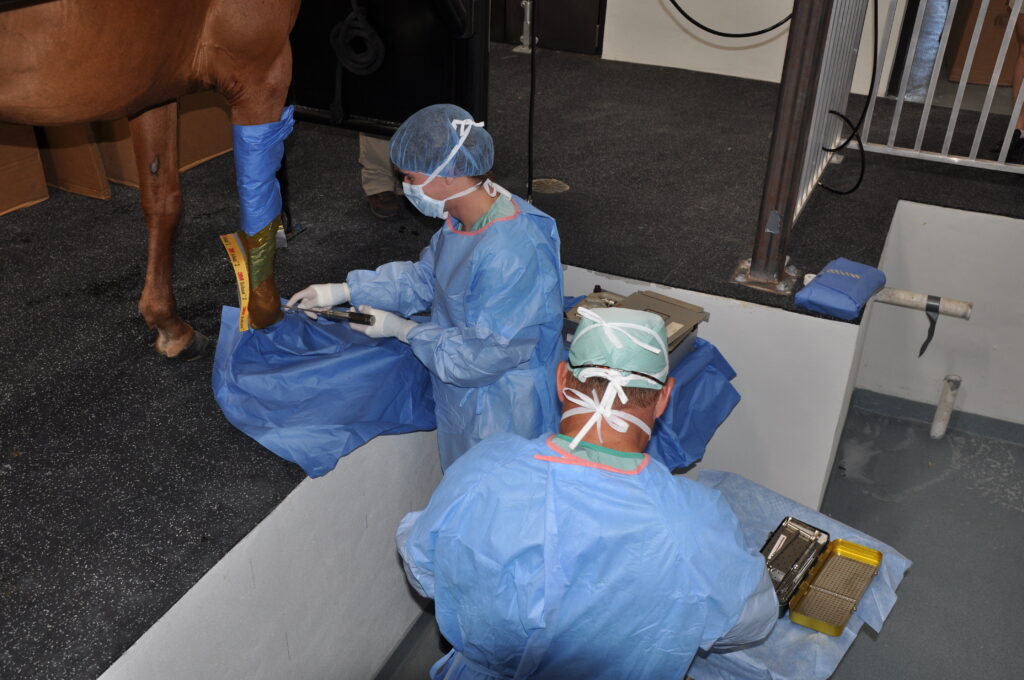
What can we find you doing when you’re not working?
I am pretty much always working, but my girlfriend is a neurology resident in Manhattan, so I try to visit her as much as I can, or I take advantage of living in Florida and go swimming.
Name one thing most people wouldn’t know about you?
I rowed for the Ithaca College crew team and while I was in vet school, I was an assistant coach for the Cornell University team.
This month, Palm Beach Equine Clinic welcomed a new face to their team. Dr. Katie Atwood, hails from Jacksonville, FL, and attended veterinary school at the University of Florida, making her return to south Florida from Lexington, KY, a special homecoming.
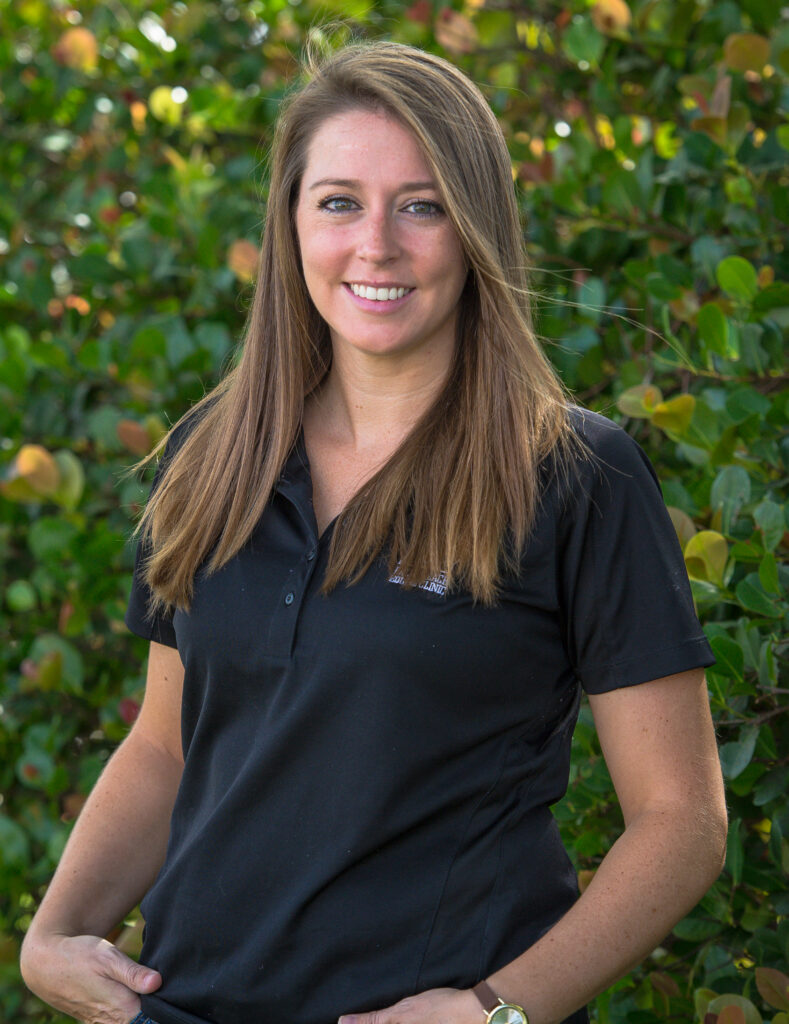
What brought you to Palm Beach Equine Clinic?
I grew up in Florida, so I wanted to be closer to family and the ocean! But, I was also looking for an opportunity to grow and become a better veterinarian. This is a difficult industry to get into, but it is especially difficult to find the right practices. This is a chance for me to work with some of the best doctors in the country.
What would you say is your specialty at Palm Beach Equine Clinic?
In addition to general, preventative and sport medicine, I will be focusing on Palm Beach Equine Clinic’s reproductive work. I did an internship and a fellowship in reproduction and realized that it is what I am most interested in. I will be working on breeding mares, performing frozen and fresh semen inseminations, as well as breeding management and embryo flushes for transfers to recipient mares.
What inspired you to be a veterinarian?
When I was a little kid we had a trail behind our house that was really popular and I would sit on the back wall and watch everybody ride by on their horses. We do not have any other veterinarians in my family, but when I was five years old I realized that I wanted to work with animals. During my undergraduate studies in Animal Science at Berry College in Rome, GA, a professor named Dr. Martin Goldberg really pushed me to pursue veterinary school.
I wake up every morning so excited to go to work and if I don’t come home exhausted and filthy then I have done something wrong. It is an “every minute of every day” commitment, but very rewarding.
When you aren’t working, where can we find you?
I like to spend as much time as possible in the water. I can usually be found swimming, diving or paddleboarding at the beach and spending time by the pool
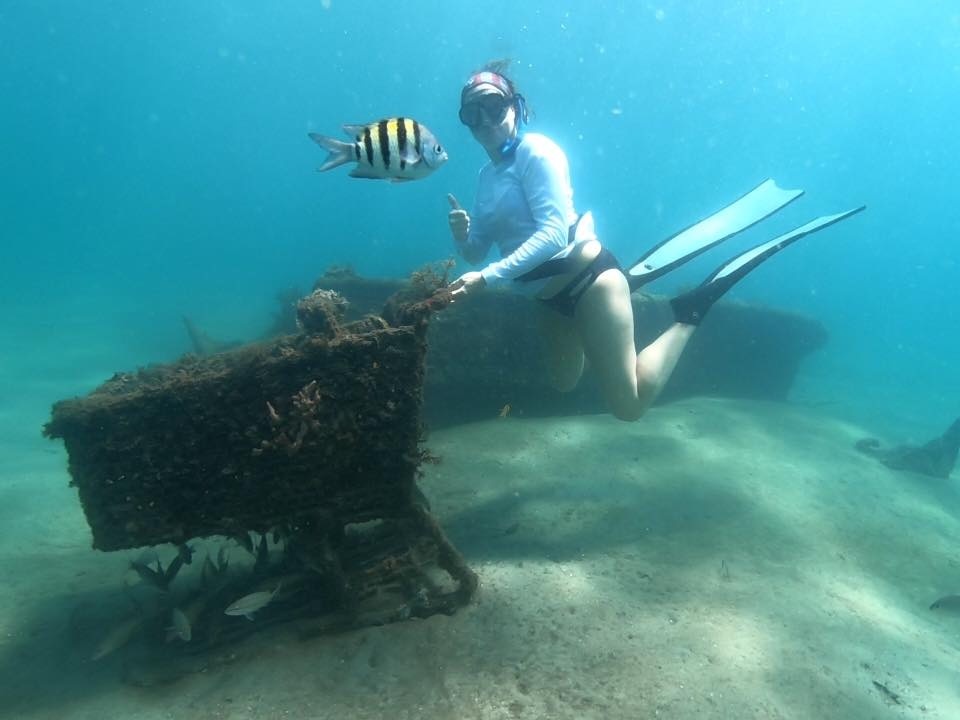
What advice would you give to someone considering pursuing veterinary school?
Do it! It will be the most difficult time of your life, but if you have a passion for it, it will be so rewarding. Dedication is so important; take advantage of every wet lab you can, go to any conference that is available, and take advantage of opportunities to meet new people and gain mentors. Who wouldn’t want to do what they love for a living?
Name one thing most people wouldn’t know about you?
I am a pretty open book at this point. But, when I retire, my fiancé Mackenzie and I want to sail around the world!
Originally hailing from Chicago, Illinois, Brittany Cain attended Southern Illinois University before moving to Florida and joining the staff of Palm Beach Equine Clinic as the manager of the Nuclear Scintigraphy department.
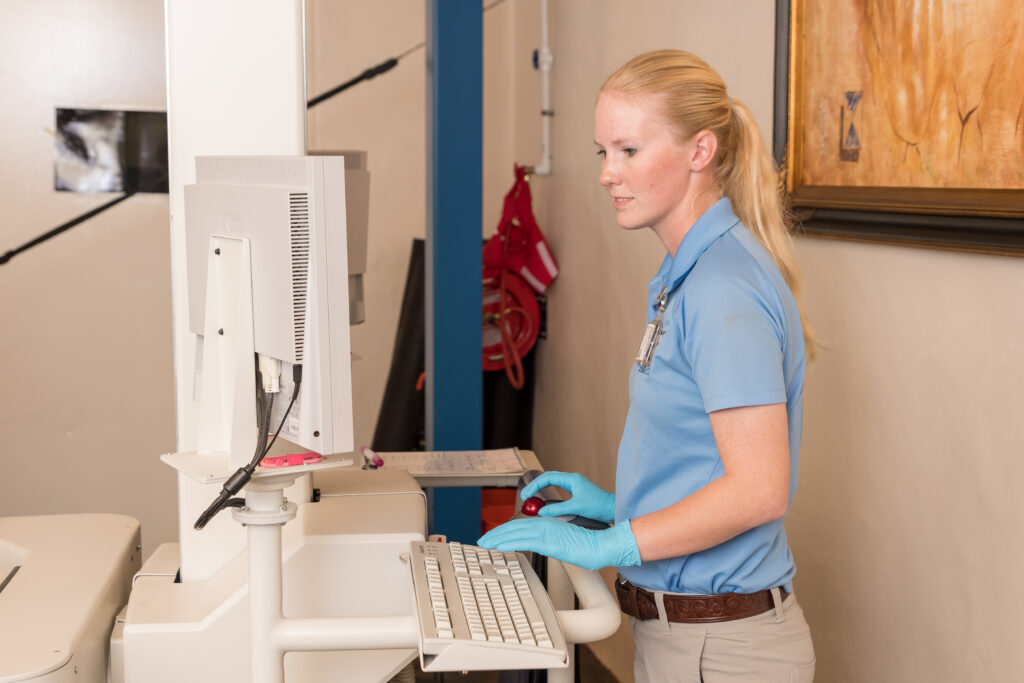
What is your background with horses?
Growing up, my parents actually had nothing to do with horses; we’re from the city of Chicago, so they were not horse people at all. I was just always the horse obsessed little girl – you know, the one horse girl in the class! When I was about 13, I started volunteering at a therapeutic riding center, so I got a lot of hands on experience there. I learned to ride a little bit and worked with the special needs kids. That was great.
When I was 18 years old and had my first paying job, I was able to afford actual riding lessons and it just went from there!
I did a lot of work on Standardbred breeding farms up in Illinois. I foaled out a lot of babies and trained a lot of weanlings. Many of those yearlings went on to be race horses. I did that for three years during college, and that was a really neat experience.
What led you to pursue a career as veterinary technician?
Throughout high school, I was always obsessed with horses. I volunteered all of my free time to be at the barn. I knew I wanted to do something that I loved, so I found Southern Illinois University, and they had a bachelor’s degree in equine science. I applied to one school, got in, and it was perfect. I didn’t have to find a bunch of schools; I just went to the one that I wanted right away, and I knew what I wanted to do!
What led to your focus on the Nuclear Scintigraphy Department in particular?
I’ve always had a strong interest in the anatomy of horses. I knew a lot of equine anatomy from college where I took many courses that covered the musculature anatomy as well as skeletal. In addition, working with all of the Standardbred yearlings was great experience for working with the two and three-year-old racehorse patients that see here at Palm Beach Equine Clinic.
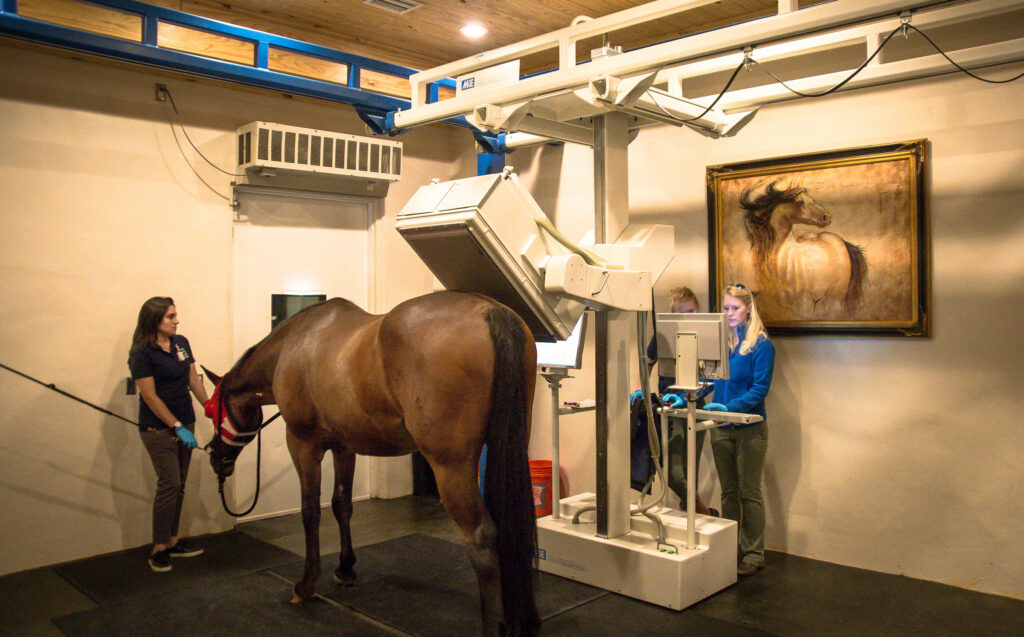
What is your typical day like at Palm Beach Equine Clinic?
As the manager of the Nuclear Scintigraphy Department, I have the patients in the scanning area for bone scans. Myself and technicians will bring the horse into the area, I will take their temperature, pulse, and respiration checks, and then I will place a catheter and inject the radioactive isotopes.
It takes two hours for the isotope to settle into the bones, and then I can begin the bone scan. I usually inject the isotope, and then I do a lot of paperwork in between the two hours since there’s a lot of tracking and recording for dealing with radioactive materials. Then the scan begins. The horse comes into the room; they’re lightly sedated. The scans usually take from one to two hours or, for a full body scan, anywhere from two to four hours. It’s a lot of keeping the horse comfortable, getting all of the images that are needed, and making sure that the images are high quality. Usually during the busy winter season, we have anywhere from two to three horses a day so it keeps me very busy.
What do you enjoy most about working at Palm Beach Equine Clinic?
I love the variety of patients that we see. We get cases of racehorses, polo ponies, barrel racers, top show jumpers, hunters and dressage. It’s really neat seeing all of these talented and often very expensive horses.
Have you had any standout or favorite moments since you joined the Palm Beach Equine Clinic team in 2015?
We went down to Miami for the Longines Global Champions Tour to assist in taking the arriving horses off the airplanes. I helped by taking temperatures, pulse, and respiration checks on all of the competition horses. It was really cool seeing the caravan from the airport to the show grounds and just how it’s set up on Miami Beach.
What do you enjoy doing when you’re not working?
My fiancé and I go fishing a lot usually at the beach or off a pier; we definitely enjoy spending our free time fishing.
